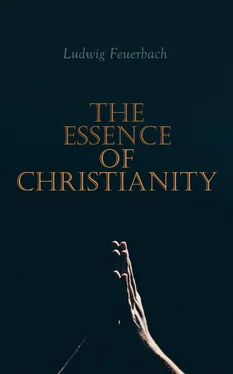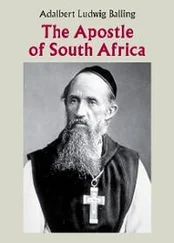That which is mysterious and incomprehensible, i.e. , contradictory, in the proposition, “God is or becomes a man,” arises only from the mingling or confusion of the idea or definitions of the universal, unlimited, metaphysical being with the idea of the religious God, i.e. , the conditions of the understanding with the conditions of the heart, the emotive nature; a confusion which is the greatest hindrance to the correct knowledge of religion. But, in fact, the idea of the Incarnation is nothing more than the human form of a God, who already in his nature, in the profoundest depths of his soul, is a merciful and therefore a human God.
The form given to this truth in the doctrine of the Church is, that it was not the first person of the Godhead who was incarnate, but the second, who is the representative of man in and before God; the second person being however in reality, as will be shown, the sole, true, first person in religion. And it is only apart from this distinction of persons that the God-man appears mysterious, incomprehensible, “speculative;” for, considered in connection with it, the Incarnation is a necessary, nay, a self-evident consequence. The allegation, therefore, that the Incarnation is a purely empirical fact, which could be made known only by means of a revelation in the theological sense, betrays the most crass religious materialism; for the Incarnation is a conclusion which rests on a very comprehensible premiss. But it is equally perverse to attempt to deduce the Incarnation from purely speculative, i.e. , metaphysical, abstract grounds; for metaphysics apply only to the first person of the Godhead, who does not become incarnate, who is not a dramatic person. Such a deduction would at the utmost be justifiable if it were meant consciously to deduce from metaphysics the negation of metaphysics.
This example clearly exhibits the distinction between the method of our philosophy and that of the old speculative philosophy. The former does not philosophise concerning the Incarnation, as a peculiar, stupendous mystery, after the manner of speculation dazzled by mystical splendour; on the contrary, it destroys the illusive supposition of a peculiar supernatural mystery; it criticises the dogma and reduces it to its natural elements, immanent in man, to its originating principle and central point—love.
The dogma presents to us two things—God and love. God is love: but what does that mean? Is God something besides love? a being distinct from love? Is it as if I said of an affectionate human being, he is love itself? Certainly; otherwise I must give up the name God, which expresses a special personal being, a subject in distinction from the predicate. Thus love is made something apart. God out of love sent his only-begotten Son. Here love recedes and sinks into insignificance in the dark background—God. It becomes merely a personal, though an essential, attribute; hence it receives both in theory and in feeling, both objectively and subjectively, the rank simply of a predicate, not that of a subject, of the substance; it shrinks out of observation as a collateral, an accident; at one moment it presents itself to me as something essential, at another, it vanishes again. God appears to me in another form besides that of love; in the form of omnipotence, of a severe power not bound by love; a power in which, though in a smaller degree, the devils participate.
So long as love is not exalted into a substance, into an essence, so long there lurks in the background of love a subject who even without love is something by himself, an unloving monster, a diabolical being, whose personality, separable and actually separated from love, delights in the blood of heretics and unbelievers,—the phantom of religious fanaticism. Nevertheless the essential idea of the Incarnation, though enveloped in the night of the religious consciousness, is love. Love determined God to the renunciation of his divinity. 3Not because of his Godhead as such, according to which he is the subject in the proposition, God is love, but because of his love, of the predicate , is it that he renounced his Godhead; thus love is a higher power and truth than deity. Love conquers God. It was love to which God sacrificed his divine majesty. And what sort of love was that? another than ours? than that to which we sacrifice life and fortune? Was it the love of himself? of himself as God? No! it was love to man. But is not love to man human love? Can I love man without loving him humanly, without loving him as he himself loves, if he truly loves? Would not love be otherwise a devilish love? The devil too loves man, but not for man’s sake—for his own; thus he loves man out of egotism, to aggrandise himself, to extend his power. But God loves man for man’s sake, i.e. , that he may make him good, happy, blessed. Does he not then love man as the true man loves his fellow? Has love a plural? Is it not everywhere like itself? What then is the true unfalsified import of the Incarnation but absolute, pure love, without adjunct, without a distinction between divine and human love? For though there is also a self-interested love among men, still the true human love, which is alone worthy of this name, is that which impels the sacrifice of self to another. Who then is our Saviour and Redeemer? God or Love? Love; for God as God has not saved us, but Love, which transcends the difference between the divine and human personality. As God has renounced himself out of love, so we, out of love, should renounce God; for if we do not sacrifice God to love, we sacrifice love to God, and, in spite of the predicate of love, we have the God—the evil being—of religious fanaticism.
While, however, we have laid open this nucleus of truth in the Incarnation, we have at the same time exhibited the dogma in its falsity; we have reduced the apparently supernatural and super-rational mystery to a simple truth inherent in human nature:—a truth which does not belong to the Christian religion alone, but which, implicitly at least, belongs more or less to every religion as such. For every religion which has any claim to the name presupposes that God is not indifferent to the beings who worship him, that therefore what is human is not alien to him, that, as an object of human veneration, he is a human God. Every prayer discloses the secret of the Incarnation, every prayer is in fact an incarnation of God. In prayer I involve God in human distress, I make him a participator in my sorrows and wants. God is not deaf to my complaints; he has compassion on me; hence he renounces his divine majesty, his exaltation above all that is finite and human; he becomes a man with man; for if he listens to me, and pities me, he is affected by my sufferings. God loves man— i.e. , God suffers from man. Love does not exist without sympathy, sympathy does not exist without suffering in common. Have I any sympathy for a being without feeling? No! I feel only for that which has feeling, only for that which partakes of my nature, for that in which I feel myself, whose sufferings I myself suffer. Sympathy presupposes a like nature. The Incarnation, Providence, prayer, are the expression of this identity of nature in God and man. 4
It is true that theology, which is pre-occupied with the metaphysical attributes of eternity, unconditionedness, unchangeableness, and the like abstractions, which express the nature of the understanding,—theology denies the possibility that God should suffer, but in so doing it denies the truth of religion. 5For religion—the religious man in the act of devotion believes in a real sympathy of the divine being in his sufferings and wants, believes that the will of God can be determined by the fervour of prayer, i.e. , by the force of feeling, believes in a real, present fulfilment of his desire, wrought by prayer. The truly religious man unhesitatingly assigns his own feelings to God; God is to him a heart susceptible to all that is human. The heart can betake itself only to the heart; feeling can appeal only to feeling; it finds consolation in itself, in its own nature alone.
Читать дальше












